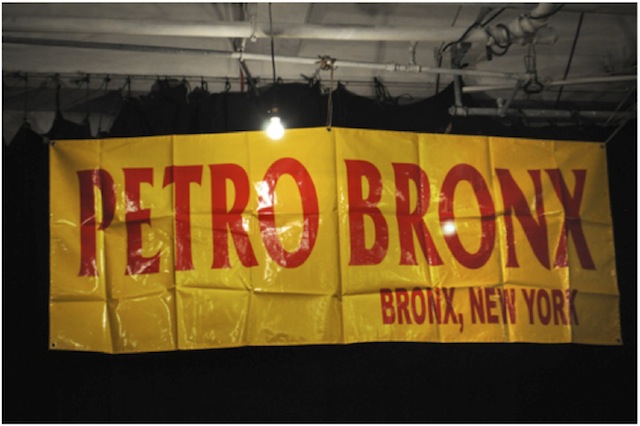
Dispatches, Venezuela
Venezuelan Funds Dry Up For Hugo Chávez Supporters In New York
July 18, 2011 By Juan Victor Fajardo
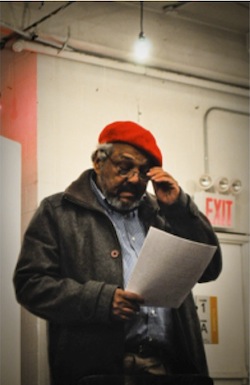
Luis Rojas reads a speech at a Petro Bronx meeting. Photo by Juan Fajardo.
OVER THE PAST FOUR years, the government of Venezuela has awarded more than $4 million to more than 30 non-profits in the South Bronx that range from local food cooperatives and interpretative dance studios, to small recycling centers and educational programs for immigrant families.
Other than the figure of Chávez himself, the big name behind it all is Citgo Petroleum Corporation, a U.S.-based subsidiary of Venezuela’s state-owned oil company PDVSA. During the first three years of the grant operation, the recipients were selected by an organization called Petro Bronx, created for the sole purpose of managing the program. It operated as a community council of sorts, bringing together a rotating group, or “collective”, of five local non-profits.
But right from the start, those involved in Petro Bronx saw themselves not as an avenue for managing charitable donations but as a pioneering social movement in line with the precepts of Chávez’s Bolivarian Revolution. They viewed Petro Bronx as the first North American chapter of Chávez’s international socialist project, known as the Bolivarian Alliance for the People of the Americas, or ALBA in Spanish.
“We accepted [the funds] as a form of solidarity from the people of Venezuela to the people of the Bronx, not as corporate charity,” said Petro Bronx founding member Luis Rojas addressing a gathering of members of the collective.
And those ideological subtleties were crucial.
“Comrades!” a red-bereted Rojas said in his speech. “This collective is and will be a part of the liberating currents of our peoples and it will be at the forefront of defending the principles of equality and justice that defined the great men of our America, starting with Simón Bolívar,” the hero of Venezuela’s war of independence.
And yet, despite their revolutionary fervor and language, the members of Petro Bronx say they turned a blind eye to political matters when selecting grant recipients each year.
“We said, ‘those who don’t want to deal with [revolutionary] politics, fine,” remembers Lucia Solano, a founding member of Petro Bronx, whose education center in the neighborhood is one of the organizations that has lost its Citgo funding. “That doesn’t mean they are not doing good work for the community.”
But people like Wanda Salaman and Joe Perez, members of the collective who also received funds, say that politics, and in particular the unbridled support of some members for the Chávez administration, became a reason for conflict within Petro Bronx.
“We didn’t [all] have the same ideology in a lot of ways,” said Salaman, director of a community center in the area. Some members “talked about Bolívar and all of these things,” she said, “they hijacked our meetings with their ideology. But I don’t care about [Chávez] and [former U.S. President George W.] Bush, what I care about is this community.”
Mejía says he “always knew [Petro Bronx] had to be careful in terms of identifying itself with certain political ideas.” But only because being prudent was necessary, he says, to fulfill the task Chávez assigned Petro Bronx in 2005 — that of spreading ALBA and Chávez’s revolution in the South Bronx – without falling foul of U.S. laws that forbid political partisanship in charitable organizations.
“The Bolivarian Revolution is not exclusively the patrimony of Venezuela,” Mejía said. “The revolution has taken steps to spread its roots, within the frame of social justice, beyond the geographic context of Venezuela,” he added, “and it has found a lot of support here in the United States.”
It is precisely that type of logic and language that put Petro Bronx at odds with Citgo. It motivated non-militant members of the collective to send letters and make phone calls to Citgo alleging that the political interests of some members were influencing the assignment of funds.
“Some of these groups just pop in and pop out,” Salaman said. “Are they really doing the work and will they continue doing the work even if they don’t get a penny from Citgo? I wanted to make sure that we were looking at groups and evaluating them and that we were not just giving them money because they were friends.”
When the third year of Citgo’s grant program came to a close in 2010, the company announced it would create the Simon Bolívar Foundation, a charitable extension of Citgo that would displace Petro Bronx entirely. Today, the Simon Bolívar Foundation manages the grant-giving process on its own from start to finish.
And when the list of awardees came out this year, the overtly political non-profits that had been running Petro Bronx since its creation were, to their surprise, simply not on it. Among the more than 30 recipients, however, were the old Petro Bronx members that had always opposed the overt politicization of the Citgo grants.
“It does not correspond with the message President Chávez gave at that meeting [in 2005],” said Mejía. The main issue, he insists, is not that there are anti-Chávez organizations among the awardees, but that most recipients have multi-million dollar budgets already. Citgo is not giving the money the non-profits “that actually need it,” said Mejía.
And maybe because they had much smaller budgets, most of the non-profits that were excluded from funding this year have now closed. Some of them had existed prior to the Citgo grant program, but had become financially dependent on Venezuelan funding.
“We are sad to say that all of these projects are paralyzed and/or closed today,” Luis Rojas told a crowd at the Petro Bronx gathering. They are closed, he added, “because, in an anti-popular and anti-Bolivarian way, some people entrenched [in Citgo] have irresponsibly and vulgarly ignored our collective.”
“I feel betrayed,” said Lucia Solano, who has taken the issue more personally. “We did not see it as asking for charity. It was about giving us support in solidarity, so we could do the work we do here.”
Although the Simon Bolívar Foundation chose not to comment on its relationship with Petro Bronx or on why some non-profits were denied funds this year, the company recently published a document that says it would not consider “political” or “sectarian” organizations for its grant program in the future.
What’s clear, however, is that no matter how betrayed some Petro Bronx members may feel, they still remain loyal to Chávez’s socialist revolution.
“As is natural, this has been problematic and traumatic for us,” Rojas said. “Because we have not been able to fulfill our promise to his Excellency the comrade, president, and comandante Hugo Rafael Chávez. Regardless, our commitment is invariable and it continues with the funds or without them.”
Closing his speech, Rojas looked to the crowd and proclaimed, “Long live the comandante Hugo Rafael Chavez Frias! Long live the people of Venezuela!”

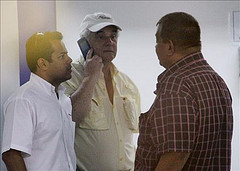
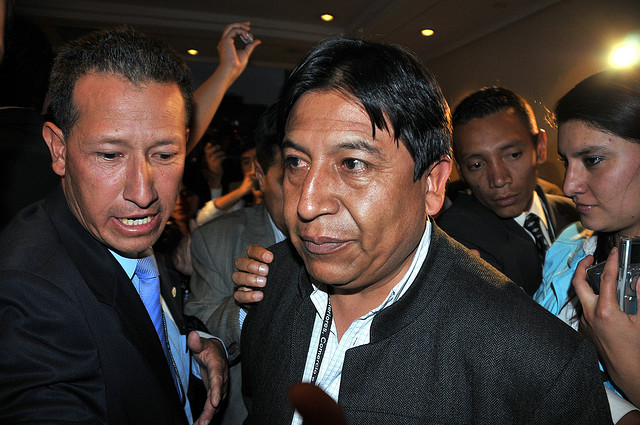
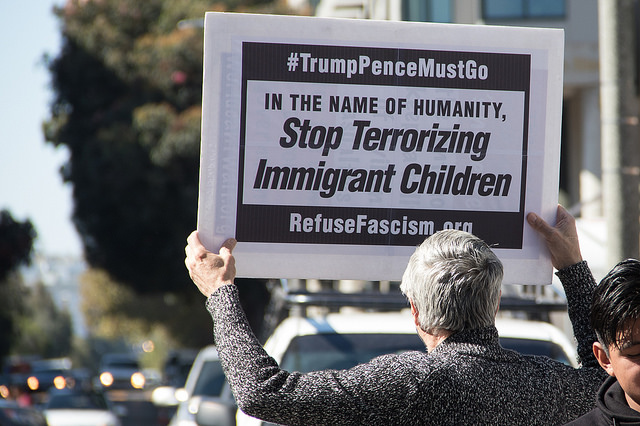
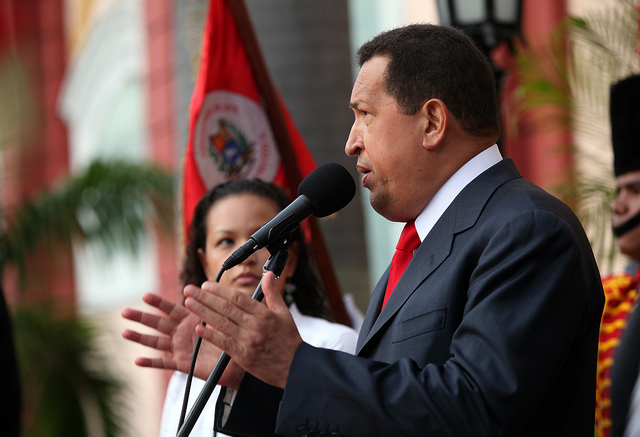
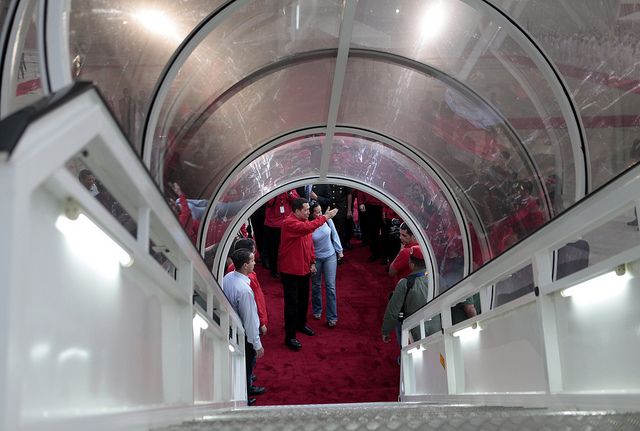
10 Comments
[…] Pro-Chávez community organizations in New York’s South Bronx that once received generous grants from the Venezuelan government have seen their funding dry up — and they want to know why. Juan Fajardo reports. […]
Gracias, Juan Victor, for your article. As the producer of the documentary I want to let your readers know that the film is making its rounds in festivals. It has been screened in the South Bronx on three different occasions and as is the trend, those who have claimed that PetroBRONX had been “hyjacked” chose not to attend as they have chosen not to be a part of the process. These public & community screening have provided us with feedback, comments, & suggestions that we’ve taken into account in our documentary. It also gave the PetroBRONX Collective the chance to pursue its goals and form a support base.
I was there throughout the initial three years (& the two prior years), recording. In our recording, Domingo de la Cruz invites President Chavez to create a reciprocal network & support a collective of organizers & activists working in the South Bronx to address chronic social & environmental problems.
Those accused of having hyjacked the collective were those most involved. They took on the tasks, duties, and above all the responsibilities necessary and made the process transparent. At any point in time, anyone so interested could have attended & observed what was going on, how, by whom, & why.
The ties with Chavez & Venezuela were ties made with the thought in mind of being reciprocal with the people & their president who offered much needed support to those on the ground working to resolve chronic issues in the South Bronx. Movements & revolutions have their epi-center, as do earthquakes, Cuba, not Venezuela, is the epi-center for the model that took shape in Venezuela as the Bolviarian Movement. Its goal, as it is for PetroBRONX, is to reach out across borders and PetroBRONX is well aware of that. To add, the collective was taking steps towards those goals. That current was opposed by those whose own goals were self-centered and parochial.
Therefore political education became an integrated part of PetroBRONX’ mission. The objective is to demonstrate gratitude, second pledge mutual support, & third in spread the principles of the social movement by serving as a living example. By incorporating those aims in their respective programs & projects, service, improvement, and development was being undertaken at the local level and expanding outward. Attending forums, summits, conferences, and creating encounters in the South Bronx & other places (all of which PetroBRONX has done in the absence of those who would criticize or condemn the collective), screening the video and being present to answer questions, distribute information, etc the goal was being accomplished.
There are several things here that are ironic. First the claim of not being or supporting “sectarian” or politicized” groups. The choices made in year four (2011) along those very lines. If you are going to claim to be involved call it a movement or a revolution for the purpose of creating change, you can’t be neutral. Every funding entity has its goals, missions, focus, & prerequisites. If you don’t meet the above you are not eligible for funding. They are called criteria.
One criteria was that you had under a $300K annual budget. Second is that your central offices and target are of service is the South Bronx. Another is whether you have other funding resources. Most of those groups, projects, & programs not receiving funds in 2011 are groups who don’t have other funding resources. The PetroBRONX source was a prime source of revenue and an means or generating the momentum to become self sufficient. Take a tour of the areas where the current recipients are located and you will find that of four groups receiving funding under the Bolivar Foundation whose doors are locked.
Having been present and involved in the grant cycle, I know that among those who are receiving funding in 2011 whether or not they, in fact, met the criteria. From first hand experience, I know of the allowances & concessions made to permit those who don’t have the language skills to follow fill out an application let alone write a proposal. Those allowances have bitten PetroBRONX in the ‘you know where’.
While PetroBRONX may not be receiving funding from neither the Bolivar Foundation or CITGO (and they may never from this point on), the collective has managed to continue. It has taken steps to incorporate, pool their resources and merge out of necessity. AfterDark CATV PRO is continuing its documentation of the collective for a sequel documentary.
Gracias, de nuevo, Juan Victor por su periodismo. LKet me know if you want a Spanish language version.
Felix Leo Campos
Gracias a ti, Felix, por haberle echado un vistazo y por aclarar algunas cosas.
I will be in back in Brooklyn Sept. 1st. Te llamo al llegar para que charlemos.
¡Saludos desde Bolivia!
Juan Víctor Fajardo
Hola Víctor Fajardo.
Gracias por publicar el documento, es lo primero que se publica de forma abierta al publico, me gustaría que el presidente Hugo Chávez Frías pudiera leer esto en un momento de reposo en su Twitter.
No me arrepiento de haber actuado como lo hice, es mi conciencia la que habla, es mi sentir por un mundo mejor, ya que con dinero o sin el seguiré apoyando la justicia mundial y los nuevos cambios que se están produciendo en nuestra América, es momento de terminar con el hambre, la falta de medicina, las paupérrimas viviendas, la falta de educación liberadora, la justicia Social, entre otras. Eso mencionado anteriormente es lo que promueve el presidente Bolivariano y son las cosas que hay que darle soporte.
Saludo especial
Gracias por tu comentario, Lucia. Un saludo solidario desde La Paz.
[…] us on Flickr Latest CommentsJuan Víctor Fajardo on Venezuelan Funds Dry Up For Hugo Chávez Supporters In New YorkLucia Solano on Venezuelan Funds Dry Up For Hugo Chávez Supporters In New YorkJuan Víctor Fajardo […]
Mr. Farjardo, the Funds have NOT DRIED UP. For FY11, CITGO and the Simon Bolivar Foundation still continues its fundamental commitment of distributing over $1.2 million to South Bronx organizations. Yes, it is disappointing and the film fades to black when nonprofits organizations that do great community work do not receive funds. However, the dependency on ONE source of funding has to stop. Nonprofits (small, midsize and large) MUST diversity its resources (via Board Development and Individual Giving Strategies) and NOT depend on foundations and corporations to fill the gaps to accomplish its goals and objectives. According to US Giving Foundation statistics, over 70% of funds come from individual donors. This is the time for organizations to starting focusing on capacity building.
[…] To Find Work After CollegeAutopsy Reveals Chile’s Salvador Allende Committed Suicide on Venezuelan Funds Dry Up For Hugo Chávez Supporters In New YorkJuan Víctor Fajardo on Venezuelan Funds Dry Up For Hugo Chávez Supporters In New YorkLucia Solano […]
Hello,
While we want to avoid any bochinche, we also want to express our gratitude to all the initial constructive Petro Bronx members, Citgo and the Simon Bolivar Foundation for the support they have committed to over the years and into the future for a variety of South Bronx organizations. As the Director of Friends of Brook Park, we did not receive funding when this initiative kicked off, but we were glad to see fellow organizations engaged in good work get this vital support, even as we hustled for other sources of funding and resources. I wonder how best to be helpful and constructive when engaged with a diverse array of energies, some not familiar with non-violent communication techniques or holistic health practices, and I like to refrain from hating on my fellow Bronxites. In any case, thanks to current support from the Simon Bolivar Foundation we are able to provide free outdoor educational activities and on-water canoe experiences to South Bronx youth and adults. If you are an organization and want to arrange a free trip thanks to their support, please contact us through http://www.friendsofbrookpark.org. There is a great deal for all of us to learn here and beyond. P’alante, nunca patra!
[…] She answered that the organization “continues to struggle on,” but that it hit a roadblock this year, when the pro-Chavez grassroots organizations in the South Bronx were defunded. […]
Comments are closed.